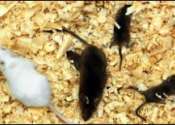Sperm tested as possible candidate for delivering cancer medications in female patients
(Phys.org)—A team of researchers with the Institute for Integrative Nanosciences in Germany has tested the possibility of using sperm cells to deliver drugs to cancerous tumors in female patients. In their paper uploaded ...









